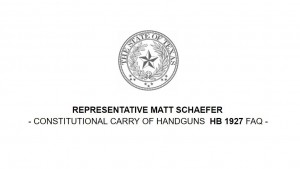News / Constitutional Carry of Handguns HB 1927 FAQ


WHAT DOES HB 1927 DO?
- Allows law-abiding individuals age 21+ to carry a handgun openly (in a holster) or concealed in non-prohibited places for the protection of themselves and their families — without having to first obtain a License To Carry (“LTC”). Prohibitions on criminals possessing firearms remain in place (e.g., felons, fugitives from justice, individuals committed by the courts for mental illness, illegal aliens, domestic abusers, etc.); increases the penalty for felons in possession of a firearm.
- Misuse of a handgun in a public place remains a criminal act.
WHO CANNOT CARRY A HANDGUN IN A PUBLIC PLACE UNDER HB 1927?
- Persons prohibited from possessing a firearm. 18 U.S.C. 922(g); Texas Penal Code 46.04.
- Persons convicted within the past five years of misdemeanor bodily assault causing injury, deadly conduct, terroristic threat, or disorderly conduct (display or discharge) of a firearm. (Penal Code 22.01(a)(1), 22.05, 22.07, or 42.01(a)(7) or (8).)
- Note: HB 1927 applies equally to Texas residents and out-of-state individuals.
HOW CAN A LAWFUL PERSON CARRY A HANDGUN UNDER HB 1927?
- HB 1927 allows both open and concealed carry without a license.
- If any part of the handgun is visible, it must be in a holster.
- HB 1927 repeals the requirement that the holster be a “belt or shoulder” holster.
WHAT PLACES ARE PROHIBITED UNDER HB 1927?
- If you are on someone else’s property—their property, their rules. Private businesses can prohibit unlicensed carry by giving notice under Penal Code 30.05, or a traditional ‘gun buster’ sign. (See below.) The penalty is a Class C misdemeanor and a maximum $200 fine if the individual leaves immediately when told.
- HB 1927 maintains currently prohibited places for persons without an LTC.
- Prohibited places include schools (including college premises), polling places, courts or offices utilized by the court, racetracks, airports past security, bars, sporting events, correctional facilities, civil commitment facilities, hospitals, nursing homes, mental hospitals, amusement parks, and governmental open meetings.
- HB 1927 prohibits the unlicensed carrying in a public place while intoxicated.
- Carry on Federal property is still restricted by federal law; note that it is a federal felony offense to carry onto post office property or military installation.
WHAT SIGNS CAN PROHIBIT CARRY OF A HANDGUN?
- Any prohibited place listed in Penal Code 46.03 may post a newly-defined sign to give clear notice that the location is prohibited. However, the sign is not required to make the place off-limits. A church or private business may prohibit unlicensed carry of a handgun under Penal Code 30.05. Notice can be a specific sign similar to 30.06 signs or any other sign “reasonably likely to come to the attention of intruders,” or any other written or verbal notice that warns individuals they are prohibited to enter the property with a firearm. A church or business may allow only concealed carry while prohibiting open carry.
- HB 1927 repeals the TABC signs prohibiting unlicensed carry in locations that sell alcohol not for consumption on premises, such as grocery stores and gas stations.
- Notice under Penal Code 30.06 or 30.07 will continue to restrict handgun license to carry holders (LTC) from carrying, but notice under 30.05 does not restrict persons with a LTC.
- If a property owner or someone with apparent authority provides notice that carrying a firearm in the location is prohibited, the person (licensed or unlicensed) must immediately depart or face a heightened penalty.
WHAT ELSE DOES HB 1927 DO?
- Allows for the expunction of criminal records for unlawful carrying of a handgun in a non-prohibited place under Penal Code 46.02(a) before 9/1/21.
- DPS will create a free, voluntary online firearm safety & handling class.
- Increases penalties for unlawful possession of a firearm by felons, individuals convicted of a Class A misdemeanor family violence, and individuals subject to a protective order who have received notice.
- Protects the right of foster parents who can legally possess firearms to carry handguns while transporting foster children in a vehicle.
CAN I / SHOULD I STILL GET A LTC?
- HB 1927 does not repeal existing LTC law. Texans who are eligible for an LTC can still obtain an LTC.
- Continued benefits of an LTC:
- Reciprocity (when carrying in other states that recognize the LTC);
- Firearm purchases (those with an LTC receive a Federal exemption from a background check when purchasing a firearm from a dealer);
- College campus carry;
- Carry on Lower Colorado River Authority property; and
- Carry in open meetings of governmental entities.
HOW DOES HB 1927 AFFECT FIREARM PURCHASE?
- HB 1927 does not in any way change who can purchase or possess a firearm or how an individual can purchase a firearm.
- All firearm purchases at retail stores or through gun dealers still require a background check, unless the purchaser is in possession of a valid LTC.
WHAT HAPPENS IN STATES THAT PASS CONSTITUTIONAL CARRY?
- A 2017 study of the states that had enacted Constitutional Carry at least five years prior found that violent crime rates decreased.
- Arizona enacted Constitutional Carry in 2011. That year, 3.6% of the population had a carry permit. In February 2021, 5.3% of the population had a carry permit.
CAN A LAW ENFORCEMENT OFFICER DETAIN SOMEONE SIMPLY FOR CARRYING A HANDGUN?
- Unclear, it depends on how the courts will interpret “A peace officer who is acting in the lawful discharge of the officer’s official duties may disarm a person at any time the officer reasonably believes it is necessary for the protection of the person, officer, or another individual.”
